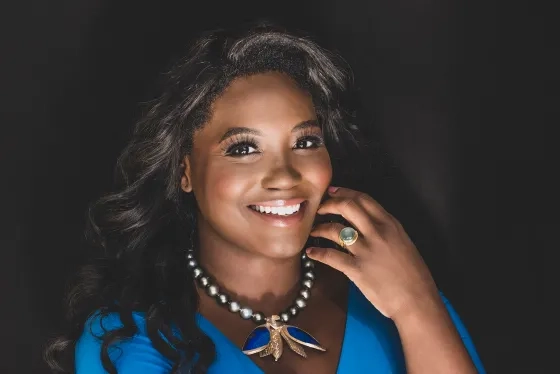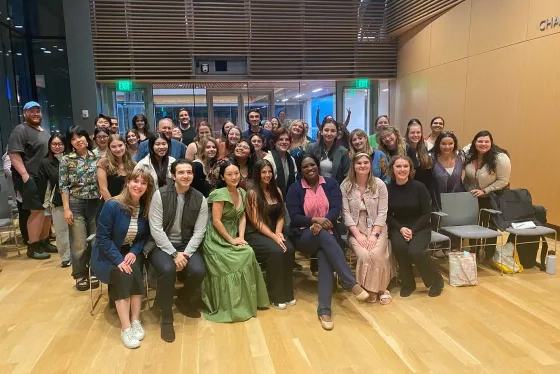Soprano Angel Blue on Her Advice for Young Singers and a Changing Opera World
News StoryBlue visited SFCM in September for a discussion moderated by voice department Chair Catherine Cook.
The cross-section of people with a GRAMMY award and a number of beauty pageant wins is a pretty small one, but that's where you'll find Angel Joy Blue. The acclaimed soprano recently visited SFCM for a students-only discussion moderated by voice department Chair Cathy Cook, and spoke to the SFCM Newsroom about her career and her advice for students. Blue is also an Askonas Holt artist, the leading artist management company acquired by SFCM in 2022. In addition to her discussion with the voice department, Blue also visited with SFCM's Black Student Union.
When did you start getting involved in opera?
I've always wanted to sing opera, I saw my first opera in concert when I was four. My dad was a voice teacher, and he was more into the opera side of things, my mom was more interested in symphonic music because she played violin.
I dabbled in other things, like I did beauty pageants for about eight years; that was mostly for scholarship money. I was studying to be a paralegal because I thought maybe opera wouldn't work out for me, and I wasn't getting into any of the programs that I wanted to get into. I had a job where I was a telemarketer at one point in school, and there was another job I had where I sold Cutco knives. But I always wanted to sing.
Did you face any systemic challenges when you started singing?
I've learned a lot about the term racism over the last year, just in terms of how people view it, what people think, but I have to be completely honest when I say I don't know that I'd be able to answer it. This topic is polarizing because it isn't what my journey in opera has been, I just haven't experienced that. My dad always had a great quote, because he did grow up in the segregated South, but he'd say, "I don't know if other people are racist. I just hope that I'm not, I hope I don't carry those things in my heart."
And that's how I feel. I very seldom think, 'Oh, this happened to me because I'm Black.' But I can easily say there have been times that things have happened to me because I'm 5'11". I've had plenty of directors say,' Oh, Angel, I really want to cast you in this role. But the tenor is 5'6" [laughs].
The biggest challenge when it comes to opera for me has been myself: It's been me overcoming obstacles and just trying to move forward regardless of what other people feel and think. I've always wanted to sing, and the only person who's really in charge of me singing is me.
You've done a lot of Puccini and Verdi, but you also starred in Fire Shut Up in My Bones by Terence Blanchard. How do you balance the canonical repertoire with exploring newer works by contemporary composers?
I really find it fascinating to work with composers of today because I can get a different perspective on the music. I actually just had dinner the other night with Terrence Blanchard because he's now the director of SFJAZZ, and just getting to sit and have the opportunity to sit down with him and listen to his stories, that helps to understand the music more. Whereas with something like Verdi, I'm at the mercy of biographies and such. But also, being an opera singer is to keep the tradition alive of the music that was written 200 years ago. So I think both are important: I don't know that I single one out, but I do find it very special to work with contemporary composers.
When you're working with younger students or artists, from the position that you're now at in your career, what's some of your advice for them in today's climate?
I was probably in my late twenties, early thirties when I started really saying, 'Angel, you're doing a good job [laughs].' In the opera world, because of the tradition, there's this idea that nobody's ever gonna be what the older singers were. Part of me agrees with that to an extent, but they also lived at a very different time, so today's singers are not often told, I think, 'Hey, you're doing a really good job. You're singing this at your recital. That's amazing!' So that encouragement has to be a part of it. Because opera is a hard job: We go out and do these long periods of rehearsal and long run of performances without our families, without the people that we're the closest to in languages we don't speak, countries where sometimes we've never been to.
What would you tell someone who's just starting out as a singer?
I'm very adamant about expressing to singers, especially those who are in school, that their journey is going to be vastly different from that of their peers, and that's okay. I auditioned twice to be an Adler fellow, and both times I made the final, but I was not accepted. I could never really get into a summer program, but I would win Miss Hollywood, Miss High Desert, Miss L.A. So I was busy in the summer and I could still sing, but I was doing something a little bit different. But all of that I attribute to why I'm where I am today. I look at it and I'm thankful for it, but when it was happening the rejection wasn't so fun. I often tell people that if you really want the career, you can have it, but there's a lot of grit and tenacity that goes into it.
Learn more about studying voice or opera at SFCM.

